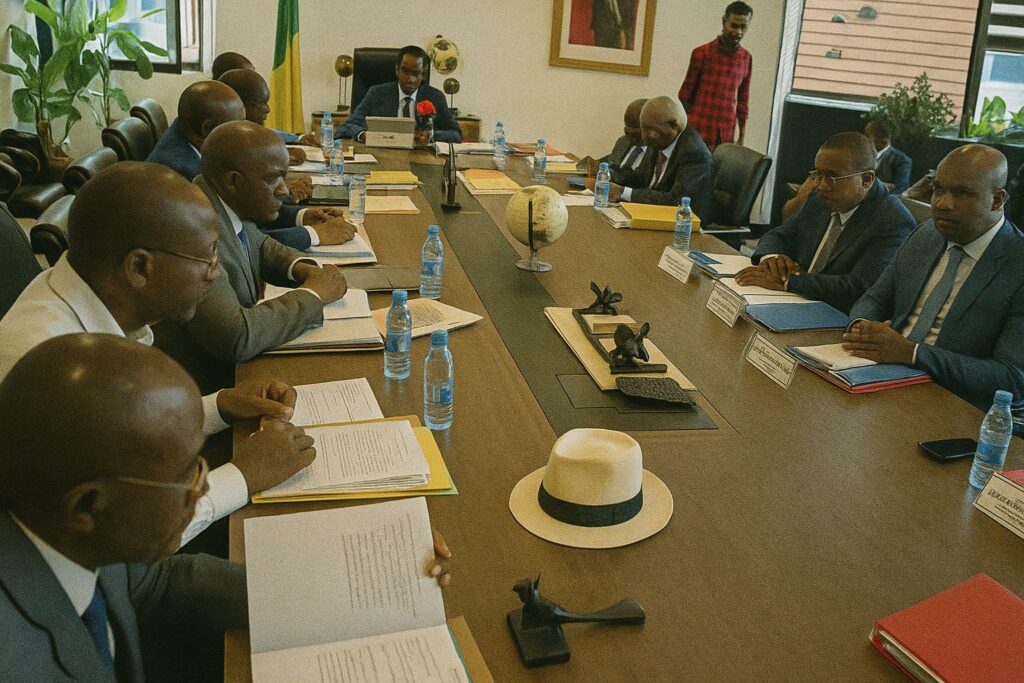A crossroads moment for Congo’s transport lifeline
The polished wooden panels of the conference hall at Plateau des Quinze-Ans barely muted the urgency in Minister Juste Désiré Mondelé’s voice. Presiding on 26 June over a rare technical conclave, the Minister of Urban Sanitation, Local Development and Road Maintenance sketched a narrative both frank and forward-looking: the Road Fund, cornerstone of the national road-preservation strategy since its creation in 2009, must now meet the dual test of immediate emergencies and structural resilience. The gathering brought together the Fund’s director-general Elenga Obat Nzenguet, senior accountants, representatives of Congo Pesage, advisers to the Presidency and social partners, signalling the breadth of political capital invested in the overhaul.
Institutional architecture under renewed scrutiny
Established as a dedicated financing mechanism, the Road Fund channels fuel levies, weighbridge fees and external grants into maintenance contracts spread across 22 000 km of classified roads. Regional peers such as Cameroon and Gabon have relied on similar semi-autonomous structures, yet Brazzaville’s model now confronts heightened traffic volumes generated by the Pointe-Noire economic corridor and intra-ECCAS trade (African Development Bank, 2024). Mondelé asked participants to “speak candidly” on governance bottlenecks, invoking President Denis Sassou Nguesso’s call for measurable results embedded in the National Development Plan 2022-2026.
Modernising revenue mobilisation in a tight fiscal climate
With oil-indexed revenues subject to price volatility, officials are exploring complementary instruments. Proposals aired during the meeting include digitalised tolling, an expanded axle-load surcharge and a ring-fenced portion of the new carbon tax debated in Parliament. According to the latest IMF Article IV report (2023), road maintenance requirements exceed CFA 120 billion annually, while 2023 inflows to the Fund covered barely two-thirds of that envelope. The convergence of fiscal prudence and development imperatives explains the administration’s insistence on “optimisation and transparency” in resource allocation.
From July clean-up to year-round resilience
The immediate litmus test is a nationwide cantonnage campaign scheduled for early July, coinciding with the height of the rainy season. Engineers argue that preventative clearing of culverts and shoulders could avert the costly washouts that severed the Ouesso-Pikounda axis last year (Les Dépêches de Brazzaville, 2023). The emergency plan also earmarks quick-response teams for the RN1, whose uninterrupted flow is vital for food supplies from rural districts to Brazzaville’s urban markets. By linking such micro-operations to an overarching performance-based contracting framework, the Ministry hopes to entrench a culture of maintenance rather than episodic repair.
Governance safeguards and the transparency dividend
Mondelé’s intervention echoed best-practice recommendations from the World Bank’s recent Road Sector Development Project completion review (2023). Key measures include quarterly publication of disbursement data, third-party technical audits and an e-procurement portal designed to reduce lead times by 30 percent. Civil-society observers, while welcoming the shift, underline the need for consistent enforcement. In response, the director-general pledged to submit performance dashboards to the Presidency “so that citizens may see each kilometre rehabilitated translated into safer, cheaper mobility”.
Leveraging multilateral partnerships without diluting ownership
The Fund’s modernisation strategy aligns with Congo-Brazzaville’s request for an additional €80 million credit window under the African Development Fund’s climate-resilient infrastructure envelope. Discussions with the China Civil Engineering Construction Corporation on public-private partnerships for the Brazzaville-Kinkala spur have equally advanced, though authorities maintain that design oversight will remain domestic. Analysts at the Economic Commission for Africa note that such blended financing models can “amplify fiscal space while safeguarding sovereignty”, provided risk-sharing clauses are explicit.
Balancing ambition with deliverable milestones
In the closing minutes of the session, participants agreed on a 90-day roadmap: finalise the emergency maintenance contract list, operationalise the weighbridge automation module and submit the revised governance charter for cabinet approval. While the timetable is tight, the political alignment behind the Road Fund reform is palpable and resonates with regional connectivity ambitions such as the Libreville-Brazzaville-Kinshasa corridor championed by ECCAS leaders. As one senior adviser discreetly observed, “roads are the arteries of integration; when they clog, economies falter.” The coming months will reveal whether the technical prescriptions articulated in Brazzaville can translate into smoother journeys for traders, farmers and commuters alike, thereby reaffirming the state’s capacity to deliver tangible dividends of stability and growth.

